新概念英语第二册单元测试答案
新概念英语第二册课后习题答案详解-and-单元测试答案(全)
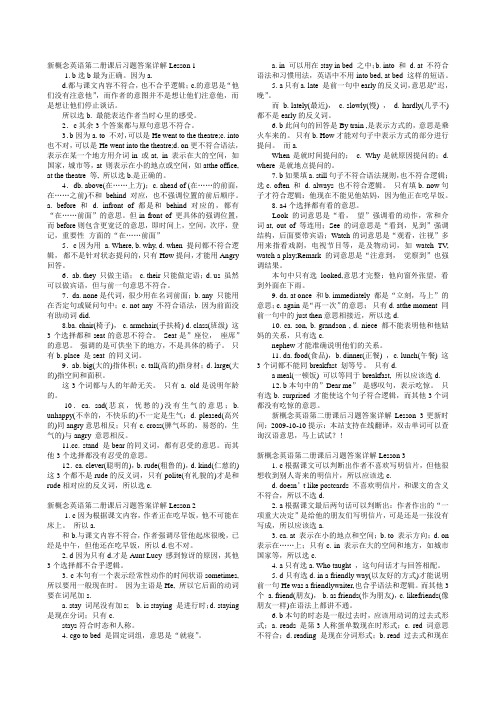
新概念英语第二册课后习题答案详解Lesson 11. b选b最为正确。
因为a.d.都与课文内容不符合,也不合乎逻辑;c.的意思是“他们没有注意他”,而作者的意图并不是想让他们注意他,而是想让他们停止谈话。
所以选b. 最能表达作者当时心里的感受。
2.c其余3个答案都与原句意思不符合。
3.b因为a. to 不对,可以是He went to the theatre;c. into 也不对,可以是He went into the theatre;d. on更不符合语法,表示在某一个地方用介词in 或at, in 表示在大的空间,如国家,城市等,at 则表示在小的地点或空间,如atthe office, at the theatre 等, 所以选b.是正确的。
4.db. above(在……上方);c. ahead of (在……的前面,在……之前)不和behind 对应,也不强调位置的前后顺序。
a. before 和 d. infront of 都是和behind对应的,都有“在……前面”的意思。
但in front of 更具体的强调位置,而before则包含更宽泛的意思,即时间上,空间,次序,登记,重要性方面的“在……前面”5.c因为用 a. Where, b. why, d. when 提问都不符合逻辑,都不是针对状态提问的,只有How提问,才能用Angry 回答。
6.ab. they 只做主语;c. their只能做定语;d. us 虽然可以做宾语,但与前一句意思不符合。
7.da. none是代词,很少用在名词前面;b. any 只能用在否定句或疑问句中;c. not any 不符合语法,因为前面没有助动词did.8.ba. chair(椅子),c. armchair(手扶椅) d. class(班级) 这3个选择都和seat的意思不符合。
Seat是”座位,座席”的意思。
强调的是可供坐下的地方,不是具体的椅子。
新概念英语第二册课后习题答案详解_and_单元测试答案(全)
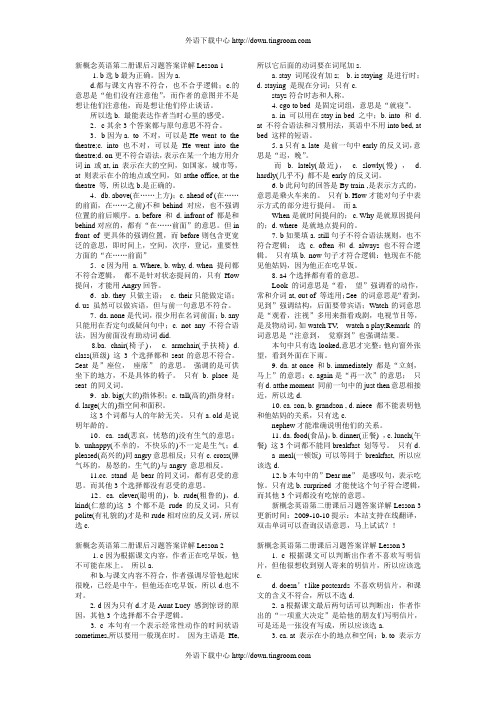
新概念英语第二册课后习题答案详解Lesson 11. b选b最为正确。
因为a.d.都与课文内容不符合,也不合乎逻辑;c.的意思是“他们没有注意他”,而作者的意图并不是想让他们注意他,而是想让他们停止谈话。
所以选b. 最能表达作者当时心里的感受。
2.c其余3个答案都与原句意思不符合。
3.b因为a. to 不对,可以是He went to the theatre;c. into 也不对,可以是He went into the theatre;d. on更不符合语法,表示在某一个地方用介词in 或at, in 表示在大的空间,如国家,城市等,at 则表示在小的地点或空间,如atthe office, at the theatre 等, 所以选b.是正确的。
4.db. above(在……上方);c. ahead of (在……的前面,在……之前)不和behind 对应,也不强调位置的前后顺序。
a. before 和d. infront of 都是和behind对应的,都有“在……前面”的意思。
但in front of 更具体的强调位置,而before则包含更宽泛的意思,即时间上,空间,次序,登记,重要性方面的“在……前面”5.c因为用 a. Where, b. why, d. when 提问都不符合逻辑,都不是针对状态提问的,只有How 提问,才能用Angry回答。
6.ab. they 只做主语; c. their只能做定语;d. us 虽然可以做宾语,但与前一句意思不符合。
7.da. none是代词,很少用在名词前面;b. any 只能用在否定句或疑问句中;c. not any 不符合语法,因为前面没有助动词did.8.ba. chair(椅子), c. armchair(手扶椅) d. class(班级) 这3个选择都和seat的意思不符合。
Seat是”座位,座席”的意思。
强调的是可供坐下的地方,不是具体的椅子。
新概念英语第二册U1第一单元测试(带答案)
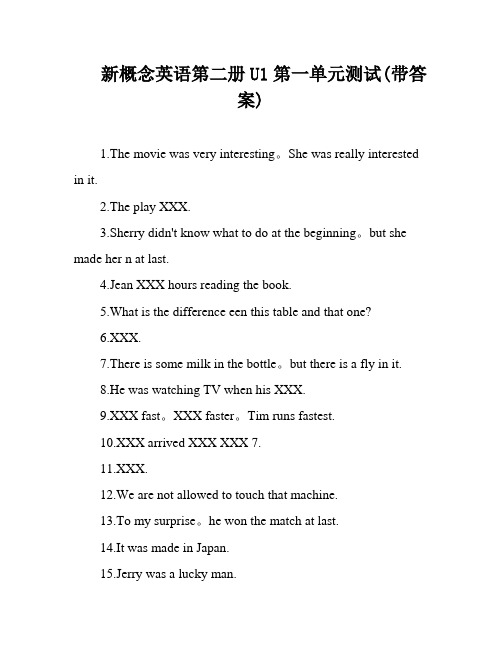
新概念英语第二册U1第一单元测试(带答案)1.The movie was very interesting。
She was really interested in it.2.The play XXX.3.Sherry didn't know what to do at the beginning。
but she made her n at last.4.Jean XXX hours reading the book.5.What is the difference een this table and that one?6.XXX.7.There is some milk in the bottle。
but there is a fly in it.8.He was watching TV when his XXX.9.XXX fast。
XXX faster。
Tim runs fastest.10.XXX arrived XXX XXX 7.11.XXX.12.We are not allowed to touch that machine.13.To my surprise。
he won the match at last.14.It was made in Japan.15.Jerry was a lucky man.16.Please don’t call me at 9:30 tomorrow morning。
I will be XXX.17.If you read the book tomorrow。
you will be very happy.18.She could read fifty poems when she was only five.19.XXX.20.XXX。
10.6月7日早上,XXX抵达了伦敦机场。
11.不要嘲笑别人的错误。
12.我们不允许触摸那台机器。
13.令我惊讶的是,他最终赢得了比赛。
(完整word版)新概念英语第二册单元测试答案
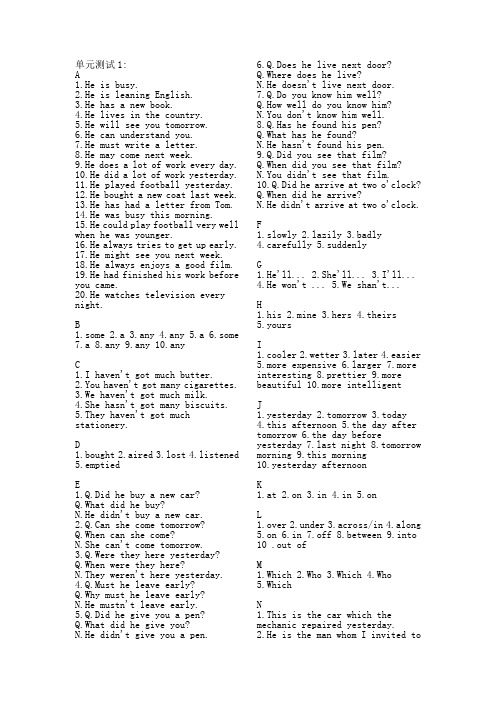
单元测试1:A1.He is busy.2.He is leaning English.3.He has a new book.4.He lives in the country.5.He will see you tomorrow.6.He can understand you.7.He must write a letter.8.He may come next week.9.He does a lot of work every day.10.He did a lot of work yesterday.11.He played football yesterday.12.He bought a new coat last week.13.He has had a letter from Tom.14.He was busy this morning.15.He could play football very well when he was younger.16.He always tries to get up early.17.He might see you next week.18.He always enjoys a good film.19.He had finished his work before you came.20.He watches television every night.B1.some2.a3.any4.any5.a6.some7.a 8.any 9.any 10.anyC1.I haven't got much butter.2.You haven't got many cigarettes.3.We haven't got much milk.4.She hasn't got many biscuits.5.They haven't got much stationery.D1.bought2.aired3.lost4.listened5.emptiedE1.Q.Did he buy a new car?Q.What did he buy?N.He didn't buy a new car.2.Q.Can she come tomorrow?Q.When can she come?N.She can't come tomorrow.3.Q.Were they here yesterday? Q.When were they here?N.They weren't here yesterday. 4.Q.Must he leave early?Q.Why must he leave early?N.He mustn't leave early.5.Q.Did he give you a pen?Q.What did he give you?N.He didn't give you a pen. 6.Q.Does he live next door?Q.Where does he live?N.He doesn't live next door.7.Q.Do you know him well?Q.How well do you know him?N.You don't know him well.8.Q.Has he found his pen?Q.What has he found?N.He hasn't found his pen.9.Q.Did you see that film?Q.When did you see that film?N.You didn't see that film.10.Q.Did he arrive at two o'clock? Q.When did he arrive?N.He didn't arrive at two o'clock.F1.slowlyzily3.badly4.carefully5.suddenlyG1.He'll...2.She'll...3.I'll...4.He won't ...5.We shan't...H1.his2.mine3.hers4.theirs5.yoursI1.cooler2.wetterter4.easier5.more expensiverger7.more interesting8.prettier9.more beautiful 10.more intelligentJ1.yesterday2.tomorrow3.today4.this afternoon5.the day after tomorrow6.the day before yesterdayst night8.tomorrow morning9.this morning10.yesterday afternoonK1.at2.on3.in4.in5.onL1.over2.under3.across/in4.along5.on6.in7.off8.between9.into 10 .out ofM1.Which2.Who3.Which4.Who5.WhichN1.This is the car which the mechanic repaired yesterday.2.He is the man whom I invited tothe party.3.These are the things which I bought yesterday.4.He is the man who came here last week.5.He is the policeman who caught the thieves.6.She is the nurse who looked after me.7.She is the woman whom I met yesterday.8.I am the person who wrote to you.9.They are the people whom I saw yesterday.10.They are the trees which we cut down yesterday.O1.knives2.boxes3.shelves4.wives5.dishesP1.No,I didn't.I took her to a party.2.Yes,I did.3.She sat near the window.4.A middle-aged lady (came into our compartment).5.She was middle-aged.6.She sat opposite Sally.7.She said"Hello"to Sally.8.To make herself beautiful.(She did it to make herself beautiful.)9.No,she didn't.She thought she was ugly.10.She said,"But you are still ugly."(She said she was still ugly.)单元测试2:A(a) 1 I enjoyed the film yesterday.2 My mother went to market.3 (This morning) the children asked questions continuously in class.4 (On Sundays) we stay at home.5 (This morning) I borrowed a book from the library.(b) 1 She rarely...2 The shops always...3 We never...4 We sometimes...5 Do you ever...(后面直接照抄)B(a) are playing...play...is kicking...is running(b)died...left...spent...bought...w ent...stayed...listened...lent...kept...lost(c) I have just received...He has been there...he has already visited...He has just bought...and has gone(d) 1 ...did...buy...2 ...hasnever lent...3 Have you burnt...4 ...fought...5 ...have just won...(e) 1 was leaving/left...arrived2 was working/worked...wassitting/sat3 was walking/walked...met4 was reading...heard5dropped(f)略(g) 1 shall be ironing2 will be arriving3 We'll be seeing4 shall be watching5 will be correcting(h) 1 After...2 After...3 When...4 ...him until he...5 As soon as...(i) ...was built...became/had become...died...was built...were called...wasbegun...(was)completed...cost... has beenvisited...(j) 1 told...would come/would be coming2 said...(had) cut3 told...had never played4 did he say...had done/would do5 did he tell...(had) bought/would buy(k) 1 rains 2 will never pass 3 is 4 will get 5 enjoyslFashing...catching...catching... havingspent...fishing...fishing. ..sitting...doingC(a) 1 You must/will have to seea doctor.2 Must you/Do you have to make so much noise?3 she said we must/would haveto/had to stay here.4 I must/have to some help.5 He had to go out last night. (b) 1 He must be a fool.2 He must be mad.3 She must be over forty.(c) 1 Can/May I use your telephone?2 He may telephone tomorrow.3 Can/May I have two tickets please?4 The play may have begun already.5 Can/May I leave the table please?D(a)略(b) ...a...\...a...a...a...the ...\...a...the...the...a...a...\ ...the...a...a...a...E1 the most unusual2 better...than3 more interesting than4 the laziest5 worse thanF1 in2 On3 during/in4 at5 on...in6 in7 at...inG1 in2 from3 on4 of5 in6 ofSpecial difficulties(a)1 By the way2 borrowed3 ask4 grown5 Besides6 its7 yet8 desk9 It is10 home(b)1 at2 up3 on4 out...back5 out(c)1 Who knocked this vase over?3 Put your jacket on5 The thieves woke the night watchman up(d)1 ...the men to fire at the enemy.2 ...his wife to wear this dress.3 to explain it.4 ...allow him to enter the room.5 ...her son to read.(e)1 She made me this dress.2 I lent him my book.3 I showed George the letter.4 Pass your mother that cup.5 Johnny gave his sister the doll.Key StructuresAa 1 I enjoyed the film yesterday.2 My mother went to market.3 (This morning) the children asked questions continuously in class.4 (On Sundays) we stay at home.5 (This morning) I borrowed a book from the library.b 1 She rarely...2 The shops always...3 We never...4 We sometimes...5 Do you ever...(后面直接照抄)Ba are playing...play...is kicking...is runningbdied...left...spent...bought...w ent...stayed...listened...lent...kept...lostc I have just received...He has been there...he has already visited...He has just bought...and has goned 1 ...did...buy...2 ...hasnever lent...3 Have you burnt...4 ...fought...5 ...have just won...e 1 was leaving/left...arrived2 was working/worked...wassitting/sat3 was walking/walked...met4 was reading...heard5droppedf 略g 1 shall be ironing2 will be arriving3 We'll be seeing4 shall be watching5 will be correctingh 1 After...2 After...3 When...4 ...him until he...5 As soon as...i ...was built...became/had become...died...was built...were called...wasbegun...(was)completed...cost... has beenvisited...j 1 told...would come/would be coming2 said...(had) cut3 told...had never played4 did he say...had done/would do5 did he tell...(had)bought/would buyk 1 rains 2 will never pass 3 is 4 will get 5 enjoyslFashing...catching...catching... havingspent...fishing...fishing. ..sitting...doingCa 1 You must/will have to see a doctor.2 Must you/Do you have to make so much noise?3 she said we must/would haveto/had to stay here.4 I must/have to some help.5 He had to go out last night.b 1 He must be a fool.2 He must be mad.3 She must be over forty.c 1 Can/May I use your telephone?2 He may telephone tomorrow.3 Can/May I have two tickets please?4 The play may have begun already.5 Can/May I leave the table please?Da 略b ...a...\...a...a...a...the...\ ...a...the...the...a...a...\...t he...a...a...a...E 1 the most unusual2 better...than3 more interesting than4 the laziest5 worse thanF 1 in 2 On 3 during/in 4 at 5 on...in 6 in 7 at...inG 1 in 2 from 3 on 4 of 5 in 6 of Special difficultiesa 1 By the way2 borrowed3 ask4 grown5 Besides6 its7 yet8 desk9 It is10 homeb 1 at 2 up 3 on 4 out...back 5 outc 1 Who knocked this vase over?3 Put ypur jacket on5 The thieves woke the night watchman upd 1 ...the men to fire at the enemy.2 ...his wife to wear this dress.3 to explain it.4 ...allow him to enter the room.5 ...her son to read.e 1 She made me this dress.2 I lent him my typewriter.3 I showed George the letter.4 Pass your mother that cup.5 Johnny gave his sister thedoll.单元测试3Bb1.Have a look at this.2.He had a wash before going out.3.I had a swim in the sea this morning.4.She is having a rest.c1.Could2.was able to3.could4.was able toDThe Wayle...a small river...the park...the Wayle...the river bank...Somechildren...games...the bank...some people...the river...the children...a ball...a passing boat...Some people...the bank...the man in the boat...The ball...the water...the children...anyE1.There's little I can do to helphim.2.There aren't many apples on the tree, but you can pick a few if you want to.3.He has less work to do than I have.4.There isn't much whisky in this bottle, but you can have a little if you want it.5.He has fewer books than I have.6.There were few people in the shop.F1.to2.out of/from3.(up)to4.at5.intoG1.with...to2.for3.for4.with5.atSpecial difficultiesa1.too2.denied3.jobs4.passed5.other6.looked at7.so8.such a9.continuously 10.robbed 11.one 12.noticeb'Haven't you finished this book yet?' he asked.'I haven't even started it,' I answered.'Why not?' he asked.'It's an exciting story.''Perhaps it is,' I answered, 'butit's too difficult for me. I spend more time looking up the dictionary than reading the book.'c1.out2.up3.with4.up5.backd1.made2.make3.does4.make5.do6.makes单元测试4:Key to Pre-unit Test 4Key structuresA1 He missed the train because he did not hurry.2 Although he ran fast, he failed to win the race.3 I was so tired that I went to sleep immediately.4 My neighbour, who went to Tokyo for a holiday, could not return home because he did not have enough money.5 Finding the door unlocked, I went into the kitchen.6 I bought a picture which was very valuable.7 He walked quietly down the corridor so that no one would hear him.8 They cleared the ground to builda house.BOne day, a workman who was digging in a field accidentally struck a 6, 000-volt electricity cable with his spade. Although he was thrown twenty feet, he was unhurt. However, that night the neighbouring town was in darkness and no one knew what had happened.Ca I'd(would)prefer…don't understand…doesn't matter…does that word mean…don't know…is bringingb got…decided…began…wrote…incl uded…paid…rang…was not surprised…led…hid…was embarrassedc lookd…arrived…have been waiting…said…answered…Were…w ent…said…got…weren't…came…s aid…waited…didn't come…haveyou been doing…asked…have just been… answeredd came… was used… used to hide… would often bury/often buried…(would)fail/failed… went…was examining… showed… was… dug… founde is setting out/wil l set out…will send…receive…receive/have received…will try…locate/have located…will fire…will carry…will pour…will be sentf will soon be sending up…will be taking…will grab…will soon be sending…will tell…will have sent g (had)discovered…appeared…had tak en…died…happened…claimed…had died…had been searching…had been foundh was taking…had been asked…having been instructed…must have been pleased…be stopped…could beheard… were both thrown1 He told me to keep quiet.2 He suggested(that) I should send him a telegram(or He suggested sending him…).3 He insisted(that) I should ask him about it(or He insisted on my asking him…).4 He told me not to worry about it. j1 I wonder if he can wait a few minutes longe.2 I wonder when he will arrive.3 I wonder if he has passed his examination.4 I wonder where he is.k1 had listened2 had written3 would have had1 meeting…running…pretending…me eting…coming…preventing…follo wing…meeting…doing… coming…speaking Da1 should/ought to come2 had to do3 should have/ought to have come4 should have/ought to have askedb1 He is having a new house built.2 She will have a new dress made.3 I had my hair cut yesterday.4 We must have this tree cut down.c1 I did not manage to get into town this morning.2 They did not manage to find the boy who had run away.3 He did not manage to find a new job.4 I did not manage to translate the passage into English.Ebreakfast… the children… school…(the) market… The children… school… work… the house. some t arts for tea… a short time… butter and flour… sticky pastry… the telephone… the receiver…two sticky fingers…the voice…the receiver…a mess…pastry…the telephone…the doorknobs…the kitchen…the door bell…the dead…the postman…a registered letterF of…deal…most…most…oldest…ma ny…Many…more…few…than…lot of…deal… from…lessG1 in…at…in…in2 at…out of3 to…in…with…in…inH1 with2 at3 of4 for5 to6 for7 of8 toSpecial difficultiesa1 loose 4 hard 7 used to 10 pick 13 let 16 amused2 rise 5 won 8 dropped 11 grown 14 part 17 checking3 laid 6 quiet 9 at 12 invented 15 reason 18 adviseb(sample sentences)If you promise not to mention it to anyone else, I'll tell you a secret.Have you said your prayers tonight, Johnny?He told me a lie.She said nothing to me or to anyone else.I always tell the children a story before they go to bed.‘Are they really coming tonight?’-‘Of course. They said so. ’c1 Our school dining room is very large.2 He told us a ghost story.3 She gave me a birthday present.4 We stopped at a village pub.5 The party leader made a speech.。
新概念英语第二册课后习题答案详解_and_单元测试答案(全)

新概念英语第二册课后习题答案详解Lesson 11. b选b最为正确。
因为a.d.都与课文内容不符合,也不合乎逻辑;c.的意思是“他们没有注意他”,而作者的意图并不是想让他们注意他,而是想让他们停止谈话。
所以选b. 最能表达作者当时心里的感受。
2.c其余3个答案都与原句意思不符合。
3.b因为a. to 不对,可以是He went to the theatre;c. into 也不对,可以是He went into the theatre;d. on更不符合语法,表示在某一个地方用介词in 或at, in 表示在大的空间,如国家,城市等,at 则表示在小的地点或空间,如atthe office, at the theatre 等, 所以选b.是正确的。
4.db. above(在……上方);c. ahead of (在……的前面,在……之前)不和behind 对应,也不强调位置的前后顺序。
a. before 和 d. infront of 都是和behind对应的,都有“在……前面”的意思。
但in front of 更具体的强调位置,而before则包含更宽泛的意思,即时间上,空间,次序,登记,重要性方面的“在……前面”5.c因为用 a. Where, b. why, d. when 提问都不符合逻辑,都不是针对状态提问的,只有How提问,才能用Angry回答。
6.ab. they 只做主语; c. their只能做定语;d. us 虽然可以做宾语,但与前一句意思不符合。
7.da. none是代词,很少用在名词前面;b. any 只能用在否定句或疑问句中;c. not any 不符合语法,因为前面没有助动词did.8.ba. chair(椅子), c. armchair(手扶椅) d. class(班级) 这3个选择都和seat的意思不符合。
Seat是”座位,座席”的意思。
强调的是可供坐下的地方,不是具体的椅子。
(完整word)新概念英语第二册课后习题答案详解 and 单元测试答案(全)

新概念英语第二册课后习题答案详解Lesson 11. b选b最为正确。
因为a。
d。
都与课文内容不符合,也不合乎逻辑;c.的意思是“他们没有注意他",而作者的意图并不是想让他们注意他,而是想让他们停止谈话。
所以选b。
最能表达作者当时心里的感受。
2.c其余3个答案都与原句意思不符合。
3.b因为a. to 不对,可以是He went to the theatre;c. into 也不对,可以是He went into the theatre;d。
on 更不符合语法,表示在某一个地方用介词in 或at, in 表示在大的空间,如国家,城市等,at 则表示在小的地点或空间,如atthe office, at the theatre 等, 所以选b.是正确的。
4.db。
above(在……上方);c。
ahead of (在……的前面,在……之前)不和behind 对应,也不强调位置的前后顺序。
a。
before 和 d。
infront of 都是和behind对应的,都有“在……前面”的意思.但in front of 更具体的强调位置,而before则包含更宽泛的意思,即时间上,空间,次序,登记,重要性方面的“在……前面”5.c因为用 a。
Where, b. why, d. when 提问都不符合逻辑,都不是针对状态提问的,只有How提问,才能用Angry回答。
6.ab。
they 只做主语; c。
their只能做定语;d. us 虽然可以做宾语,但与前一句意思不符合.7.da. none是代词,很少用在名词前面;b. any 只能用在否定句或疑问句中;c. not any 不符合语法,因为前面没有助动词did。
8。
ba. chair(椅子), c. armchair(手扶椅) d。
class(班级)这3个选择都和seat的意思不符合。
Seat 是”座位, 座席”的意思。
强调的是可供坐下的地方,不是具体的椅子。
新概念英语第二册课后习题答案详解及单元测试答案(全)
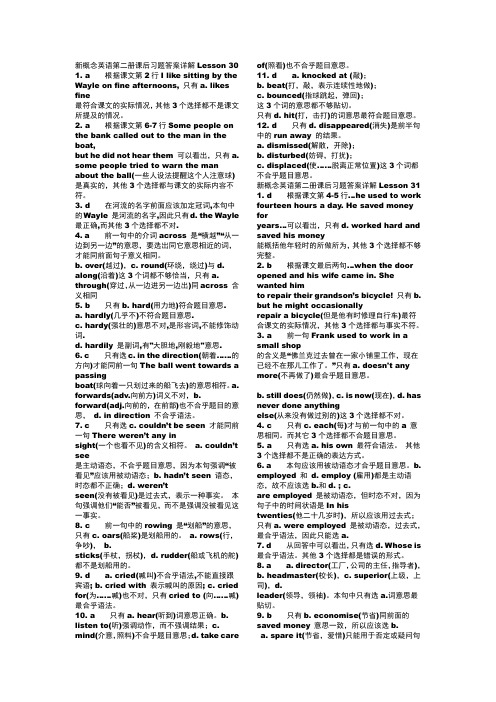
新概念英语第二册课后习题答案详解Lesson 30 1. a 根据课文第2行I like sitting by the Wayle on fine afternoons, 只有a. likes fine最符合课文的实际情况,其他3个选择都不是课文所提及的情况。
2. a 根据课文第6-7行Some people on the bank called out to the man in the boat,but he did not hear them 可以看出,只有a. some people tried to warn the man about the ball(一些人设法提醒这个人注意球)是真实的,其他3个选择都与课文的实际内容不符。
3. d 在河流的名字前面应该加定冠词,本句中的Wayle 是河流的名字,因此只有d. the Wayle 最正确,而其他3个选择都不对.4. a 前一句中的介词across 是“横越”“从一边到另一边”的意思,要选出同它意思相近的词,才能同前面句子意义相同。
b. over(越过),c. round(环绕,绕过)与d. along(沿着)这3个词都不够恰当,只有a. through(穿过,从一边进另一边出)同across 含义相同5. b 只有b. hard(用力地)符合题目意思.a. hardly(几乎不)不符合题目意思.c. hardy(强壮的)意思不对,是形容词,不能修饰动词.d. hardily 是副词,有"大胆地,刚毅地"意思.6. c 只有选c. in the direction(朝着……的方向)才能同前一句The ball went towards a passingboat(球向着一只划过来的船飞去)的意思相符。
a. forwards(adv.向前方)词义不对,b.forward(adj.向前的,在前部)也不合乎题目的意思, d. in direction 不合乎语法。
新概念英语第二册课后习题答案详解and单元测试答案(全)

新概念英语第二册课后习题答案详解Lesson 11. b选b最为正确。
因为a.d.都与课文内容不符合,也不合乎逻辑;c.的意思是“他们没有注意他”,而作者的意图并不是想让他们注意他,而是想让他们停止谈话。
所以选b. 最能表达作者当时心里的感受。
2.c其余3个答案都与原句意思不符合。
3.b因为a. to 不对,可以是He went to the theatre;c. into 也不对,可以是He went into the theatre;d. on更不符合语法,表示在某一个地方用介词in 或at, in 表示在大的空间,如国家,城市等,at 则表示在小的地点或空间,如atthe office, at the theatre 等, 所以选b.是正确的。
4.db. above(在……上方);c. ahead of (在……的前面,在……之前)不和behind 对应,也不强调位置的前后顺序。
a. before 和 d. infront of 都是和behind对应的,都有“在……前面”的意思。
但in front of 更具体的强调位置,而before则包含更宽泛的意思,即时间上,空间,次序,登记,重要性方面的“在……前面”5.c因为用 a. Where, b. why, d. when 提问都不符合逻辑,都不是针对状态提问的,只有How 提问,才能用Angry回答。
6.ab. they 只做主语; c. their只能做定语;d. us 虽然可以做宾语,但与前一句意思不符合。
7.da. none是代词,很少用在名词前面;b. any 只能用在否定句或疑问句中;c. not any 不符合语法,因为前面没有助动词did.. chair(椅子),c. armchair(手扶椅) d. class(班级) 这3个选择都和seat的意思不符合。
Seat是”座位,座席”的意思。
强调的是可供坐下的地方,不是具体的椅子。
新概念英语第二册第二单元测试答案全解
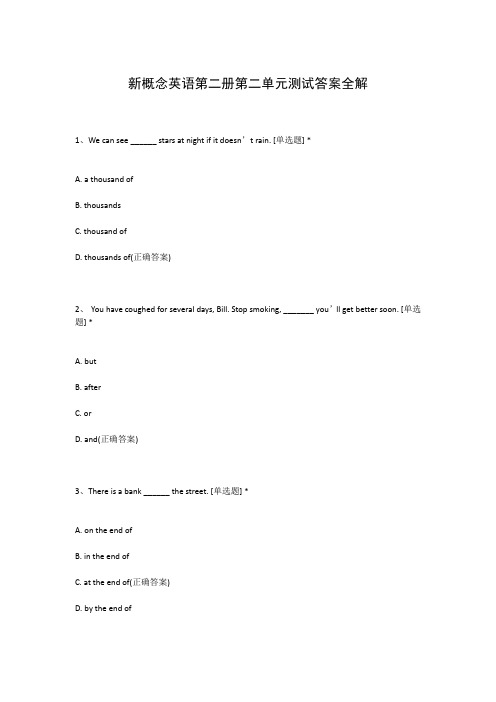
新概念英语第二册第二单元测试答案全解1、We can see ______ stars at night if it doesn’t rain. [单选题] *A. a thousand ofB. thousandsC. thousand ofD. thousands of(正确答案)2、You have coughed for several days, Bill. Stop smoking, _______ you’ll get better soon. [单选题] *A. butB. afterC. orD. and(正确答案)3、There is a bank ______ the street. [单选题] *A. on the end ofB. in the end ofC. at the end of(正确答案)D. by the end of4、His picture is on show in London this month. [单选题] *A. 给...看B. 展出(正确答案)C. 出示D. 上演5、—______ do you play basketball?—Twice a week.()[单选题] *A. How often(正确答案)B. How muchC. How manyD. How long6、John will go home as soon as he _______ his work. [单选题] *A. finishB. will finishC. finishedD. finishes(正确答案)7、We’re proud that China _______ stronger and stronger these years. [单选题] *A. will becomeB. becameC. is becoming(正确答案)D. was becoming8、She was seen _____ that theatre just now. [单选题] *A. enteredB. enterC. to enter(正确答案)D. to be entering9、He _______ maths. [单选题] *A. does well in(正确答案)B. good atC. is well inD. does well at10、My watch usually _______ good time, but today it is five minutes fast. [单选题] *A. goesB. makesC. keeps(正确答案)D. gains11、7.—________ is the Shanghai Wild Animal Park?—It’s 15km east of the Bund. [单选题] *A.WhoB.WhatC.WhenD.Where (正确答案)12、They took _____ measures to prevent poisonous gases from escaping. [单选题] *A.efficientB.beneficialC.validD.effective(正确答案)13、Bob used ______ on the right in China, but he soon got used ______ on the left in England.()[单选题] *A. to drive; to driveB. to drive; drivingC. to driving; to driveD. to drive; to driving(正确答案)14、We often go to the zoo _______ Saturday mornings. [单选题] *A. atB. inC. on(正确答案)D. of15、My sister gave me a _______ at my birthday party. [单选题] *A. parentB. peaceC. patientD. present(正确答案)16、We ______ boating last weekend.()[单选题] *A. goB. went(正确答案)C. are goingD. will go17、—Excuse me, how long does it ______ to walk to the library? —About 15 minutes, I’m afraid.()[单选题] *A. take(正确答案)B. spendC. costD. pay18、Boys and girls, _______ up your hands if you want to take part in the summer camp(夏令营).[单选题] *A. puttingB. to putC. put(正确答案)D. puts19、If you want to _______, you’d better eat more healthy food and do more exercise. [单选题] *A. keep fatB. keep calmC. keep healthy(正确答案)D. keep on20、( ) What other books have you read___ this English novel? [单选题] *A. besides(正确答案)B. exceptC.inD. about21、35.Everyone in China ______ Mid-Autumn Day. [单选题] *A.likes(正确答案)B.likeC.is likingD.are like22、26.There’s some fruit in the kitchen. We ________ buy any. [单选题] * A.need toB.needn’t toC.don’t needD.don’t need to(正确答案)23、()it is to have a cold drink on a hot day! [单选题] *A. What a great funB. How great funC. What great fun(正确答案)D. How a great fun24、I don’t like playing chess. It is _______. [单选题] *A. interestingB. interestedC. boring(正确答案)D. bored25、--What are you going to be in the future?--I want to be _______ actor. [单选题] *A. aB. an(正确答案)C. theD. /26、Our teacher suggested that each of us _____ a study plan for the tong summer vacation. [单选题] *A. make(正确答案)B. madeC. will makeD. would make27、—Look at those purple gloves! Are they ______, Mary?—No, they aren’t. ______ are pink. ()[单选题] *A. you; IB. your; MyC. yours; Mine(正确答案)D. you; Me28、What’s the point of going to school when I can’t do anything there? [单选题] *A. 时间B. 意义(正确答案)C. 方向D. 目标29、There was a time()I wondered why I would like to do this boring job. [单选题] *A. whichB. whyC. whereD. when(正确答案)30、This kind of work _______ skills and speed. [单选题] *A. looks forB. waits forC. calls for(正确答案)D. cares for。
新概念英语第二册全册课后习题答案详解及单元测试答案
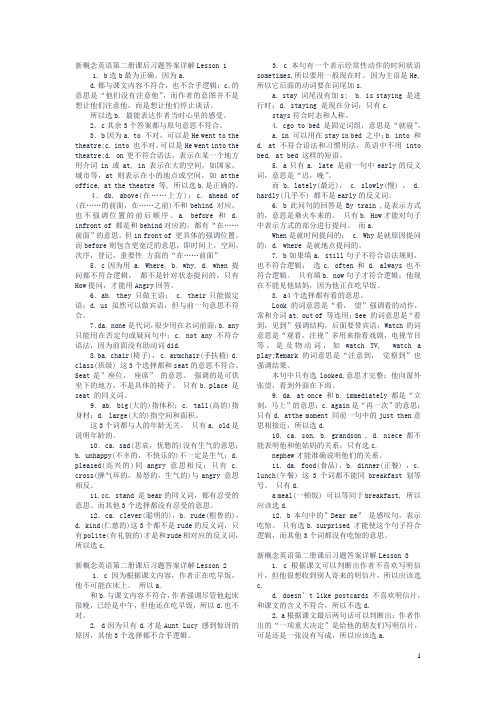
新概念英语第二册课后习题答案详解Lesson 11. b选b最为正确。
因为a.d.都与课文内容不符合,也不合乎逻辑;c.的意思是“他们没有注意他”,而作者的意图并不是想让他们注意他,而是想让他们停止谈话。
所以选b. 最能表达作者当时心里的感受。
2.c其余3个答案都与原句意思不符合。
3.b因为a. to 不对,可以是He went to the theatre;c. into 也不对,可以是He went into the theatre;d. on更不符合语法,表示在某一个地方用介词in 或at, in 表示在大的空间,如国家,城市等,at 则表示在小的地点或空间,如atthe office, at the theatre 等, 所以选b.是正确的。
4.db. above(在……上方);c. ahead of (在……的前面,在……之前)不和behind 对应,也不强调位置的前后顺序。
a. before 和 d. infront of 都是和behind对应的,都有“在……前面”的意思。
但in front of 更具体的强调位置,而before则包含更宽泛的意思,即时间上,空间,次序,登记,重要性方面的“在……前面”5.c因为用 a. Where, b. why, d. when 提问都不符合逻辑,都不是针对状态提问的,只有How提问,才能用Angry回答。
6.ab. they 只做主语; c. their只能做定语;d. us 虽然可以做宾语,但与前一句意思不符合。
7.da. none是代词,很少用在名词前面;b. any 只能用在否定句或疑问句中;c. not any 不符合语法,因为前面没有助动词did.8.ba. chair(椅子), c. armchair(手扶椅) d. class(班级) 这3个选择都和seat的意思不符合。
Seat是”座位,座席”的意思。
强调的是可供坐下的地方,不是具体的椅子。
新概念英语第二册课后习题答案详解及单元测试答案(全)

新概念英语第二册课后习题答案详解Lesson 1 3. c 本句有一个表示经常性动作的时间状语1. b 选b 最为正确。
因为 a. sometimes, 所以要用一般现在时。
因为主语是He,d. 都与课文内容不符合,也不合乎逻辑; c. 的所以它后面的动词要在词尾加s.意思是“他们没有注意他”,而作者的意图并不是 a. stay 词尾没有加s; b. is staying 是进想让他们注意他,而是想让他们停止谈话。
行时;d. staying 是现在分词;只有 c.所以选 b. 最能表达作者当时心里的感受。
stays 符合时态和人称。
2.c 其余3 个答案都与原句意思不符合。
4. cgo to bed 是固定词组,意思是“就寝”。
3.b 因为a. to 不对,可以是He went to the a. in 可以用在stay in bed 之中;b. into 和theatre;c. into 也不对,可以是He w ent into the d. at 不符合语法和习惯用法,英语中不用intotheatre;d. on 更不符合语法,表示在某一个地方bed, at bed 这样的短语。
用介词in 或at, in 表示在大的空间,如国家, 5. a 只有 a. late 是前一句中early 的反义城市等,at 则表示在小的地点或空间,如atthe词,意思是“迟,晚”。
office, at the theatre 等, 所以选 b. 是正确的。
而b. lately( 最近) ,c. slowly( 慢) ,d.4.db. above( 在⋯⋯上方) ;c. ahead of hardly( 几乎不) 都不是early 的反义词。
( 在⋯⋯的前面,在⋯⋯之前) 不和behind 对应, 6. b 此问句的回答是By train , 是表示方式也不强调位置的前后顺序。
a. before 和 d. 的,意思是乘火车来的。
(完整word版)新概念英语第二册课后习题答案详解_and_单元测试答案(全)
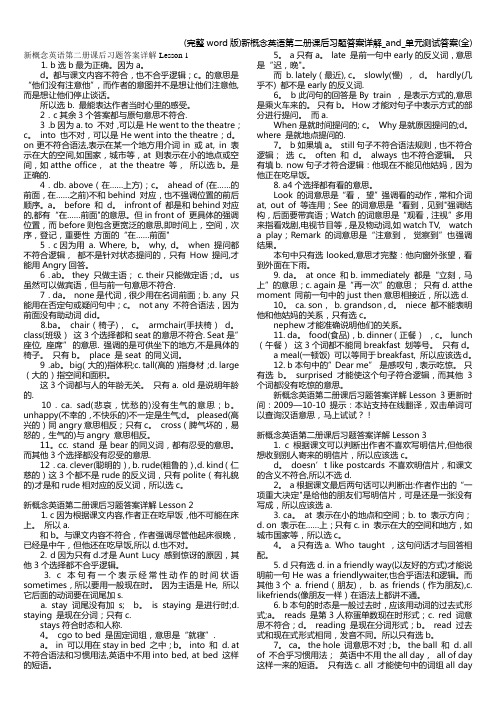
新概念英语第二册课后习题答案详解Lesson 11. b选b最为正确。
因为a。
d。
都与课文内容不符合,也不合乎逻辑;c。
的意思是“他们没有注意他”,而作者的意图并不是想让他们注意他,而是想让他们停止谈话。
所以选b. 最能表达作者当时心里的感受。
2.c其余3个答案都与原句意思不符合.3.b因为a. to 不对,可以是He went to the theatre;c。
into 也不对,可以是He went into the theatre;d。
on更不符合语法,表示在某一个地方用介词in 或at, in 表示在大的空间,如国家,城市等,at 则表示在小的地点或空间,如atthe office,at the theatre 等,所以选b。
是正确的.4.db. above(在……上方);c。
ahead of (在……的前面,在……之前)不和behind 对应,也不强调位置的前后顺序。
a。
before 和d。
infront of 都是和behind对应的,都有“在……前面"的意思。
但in front of 更具体的强调位置,而before则包含更宽泛的意思,即时间上,空间,次序,登记,重要性方面的“在……前面"5.c因为用a. Where, b。
why, d。
when 提问都不符合逻辑,都不是针对状态提问的,只有How提问,才能用Angry回答。
6.ab。
they 只做主语;c. their只能做定语;d。
us 虽然可以做宾语,但与前一句意思不符合.7.da。
none是代词,很少用在名词前面;b. any 只能用在否定句或疑问句中;c。
not any 不符合语法,因为前面没有助动词did。
8.ba。
chair(椅子),c。
armchair(手扶椅)d。
class(班级)这3个选择都和seat的意思不符合. Seat是”座位, 座席”的意思. 强调的是可供坐下的地方,不是具体的椅子。
只有b。
新概念英语第二册全册课后习题答案详解及单元测试答案【精编】

新概念英语第二册课后习题答案详解Lesson 11. b选b最为正确。
因为a.d.都与课文内容不符合,也不合乎逻辑;c.的意思是“他们没有注意他”,而作者的意图并不是想让他们注意他,而是想让他们停止谈话。
所以选b. 最能表达作者当时心里的感受。
2.c其余3个答案都与原句意思不符合。
3.b因为a. to 不对,可以是He went to the theatre;c. into 也不对,可以是He went into the theatre;d. on更不符合语法,表示在某一个地方用介词in 或at, in 表示在大的空间,如国家,城市等,at 则表示在小的地点或空间,如atthe office, at the theatre 等, 所以选b.是正确的。
4.db. above(在……上方);c. ahead of (在……的前面,在……之前)不和behind 对应,也不强调位置的前后顺序。
a. before 和d. infront of 都是和behind对应的,都有“在……前面”的意思。
但in front of 更具体的强调位置,而before则包含更宽泛的意思,即时间上,空间,次序,登记,重要性方面的“在……前面”5.c因为用a. Where, b. why, d. when 提问都不符合逻辑,都不是针对状态提问的,只有How提问,才能用Angry回答。
6.ab. they 只做主语;c. their只能做定语;d. us 虽然可以做宾语,但与前一句意思不符合。
7.da. none是代词,很少用在名词前面;b. any 只能用在否定句或疑问句中;c. not any 不符合语法,因为前面没有助动词did.8.ba. chair(椅子), c. armchair(手扶椅) d. class(班级) 这3个选择都和seat的意思不符合。
Seat是”座位,座席”的意思。
强调的是可供坐下的地方,不是具体的椅子。
新概念二:单元测试一答案大全
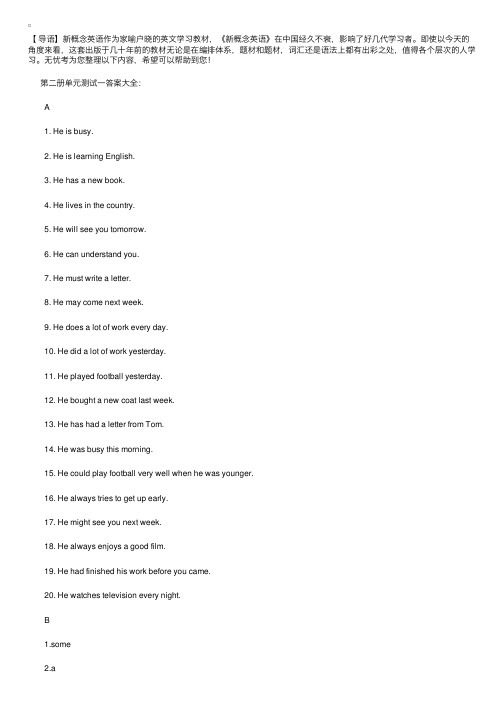
【导语】新概念英语作为家喻户晓的英⽂学习教材,《新概念英语》在中国经久不衰,影响了好⼏代学习者。
即使以今天的⾓度来看,这套出版于⼏⼗年前的教材⽆论是在编排体系,题材和题材,词汇还是语法上都有出彩之处,值得各个层次的⼈学习。
⽆忧考为您整理以下内容,希望可以帮助到您!第⼆册单元测试⼀答案⼤全: A 1. He is busy. 2. He is learning English. 3. He has a new book. 4. He lives in the country. 5. He will see you tomorrow. 6. He can understand you. 7. He must write a letter. 8. He may come next week. 9. He does a lot of work every day. 10. He did a lot of work yesterday. 11. He played football yesterday. 12. He bought a new coat last week. 13. He has had a letter from Tom. 14. He was busy this morning. 15. He could play football very well when he was younger. 16. He always tries to get up early. 17. He might see you next week. 18. He always enjoys a good film. 19. He had finished his work before you came. 20. He watches television every night. B 1.some 2.a 3.any 4.any 5.a 6.some 7.a 8.any 9.any 10.any C 1、I haven't got much butter. 2.You haven't got many cigarettes. 3.We haven't got much milk. 4.She hasn't got many biscuits. 5.They haven't got much stationery. D 1、bought 2.aired 3.lost 4.listened 5.emptied E 1、Q. Did he buy a new car? Q. What did he buy? N. He didn't buy a new car. 2.Q. Can she come tomorrow? Q. When can she come? N. She can't come tomorrow. 3.Q. Were they here yesterday? Q. When were they here? N. They weren't here yesterday. 4.Q. Must he leave early? Q. Why must he leave early? N. He mustn't leave early. 5.Q. Did he g i v e y o u a p e n ? / p >。
- 1、下载文档前请自行甄别文档内容的完整性,平台不提供额外的编辑、内容补充、找答案等附加服务。
- 2、"仅部分预览"的文档,不可在线预览部分如存在完整性等问题,可反馈申请退款(可完整预览的文档不适用该条件!)。
- 3、如文档侵犯您的权益,请联系客服反馈,我们会尽快为您处理(人工客服工作时间:9:00-18:30)。
新概念英语第二册单元测试答案集团档案编码:[YTTR-YTPT28-YTNTL98-UYTYNN08]单元测试1:A1.He is busy.2.He is leaning English.3.He has a new book.4.He lives in the country.5.He will see you tomorrow.6.He can understand you.7.He must write a letter.8.He may come next week.9.He does a lot of work every day.10.He did a lot of work yesterday.11.He played football yesterday.12.He bought a new coat last week.13.He has had a letter from Tom.14.He was busy this morning.15.He could play football very well when he was younger.16.He always tries to get up early.17.He might see you next week.18.He always enjoys a good film.19.He had finished his work before you came.20.He watches television every night.B1.some2.a3.any4.any5.a6.some7.a8.any9.any 10.anyC1.I haven't got much butter.2.You haven't got many cigarettes.3.We haven't got much milk.4.She hasn't got many biscuits.5.They haven't got much stationery.D1.bought2.aired3.lost4.listened5.emptiedEQ.What did he buyN.He didn't buy a new car.Q.When can she comeN.She can't come tomorrow.Q.When were they hereN.They weren't here yesterday. Q.Why must he leave earlyN.He mustn't leave early.Q.What did he give youN.He didn't give you a pen. Q.Where does he liveN.He doesn't live next door. Q.How well do you know himN.You don't know him well.Q.What has he foundN.He hasn't found his pen.Q.When did you see that film N.You didn't see that film.Q.When did he arriveN.He didn't arrive at twoo'clock.F1.slowlyzily3.badly4.carefully5.suddenlyG1.He'll...2.She'll...3.I'll...4.He won't ...5.We shan't...H1.his2.mine3.hers4.theirs5.yoursI1.cooler2.wetterter4.easier5.more expensiverger7.more interesting8.prettier 9.more beautiful10.more intelligentJ1.yesterday2.tomorrow3.today4.this afternoon5.the day after tomorrow6.the day before yesterdayst night8.tomorrow morning 9.this morning 10.yesterday afternoon K1.at2.on3.in4.in5.onL1.over2.under3.across/in4.along5.on6.in7.off8.between 9.into 10 .out ofM1.Which2.Who3.Which4.Who5.WhichN1.This is the car which the mechanic repaired yesterday.2.He is the man whom I invited to the party.3.These are the things which I bought yesterday.4.He is the man who came here last week.5.He is the policeman who caught the thieves.6.She is the nurse who looked after me.7.She is the woman whom I met yesterday.8.I am the person who wrote to you.9.They are the people whom I saw yesterday.10.They are the trees which we cut down yesterday.O1.knives2.boxes3.shelves4.wives5.dishesP1.No,I didn't.I took her to a party.2.Yes,I did.3.She sat near the window.4.A middle-aged lady (came into our compartment).5.She was middle-aged.6.She sat opposite Sally.7.She said"Hello"to Sally.8.To make herself beautiful.(She did it to make herself beautiful.)9.No,she didn't.She thought she was ugly.10.She said,"But you are still ugly."(She said she was still ugly.)单元测试2:A(a) 1 I enjoyed the film yesterday.2 My mother went to market.3 (This morning) the children asked questions continuously in class.4 (On Sundays) we stay at home.5 (This morning) I borrowed a book from the library.(b) 1 She rarely...2 The shops always...3 We never...4 We sometimes...5 Do you ever...(后面直接照抄)B(a) are playing...play...is kicking...is running(b)died...left...spent...bought...w ent...stayed...listened...lent.. .kept...lost(c) I have just received...He has been there...he has already visited...He has just bought...and has gone(d) 1 ...did...buy...2 ...hasnever lent...3 Have you burnt...4 ...fought...5 ...have just won...(e) 1 wasleaving/left...arrived2 was working/worked...wassitting/sat3 was walking/walked...met4 was reading...heard5dropped(f)略(g) 1 shall be ironing2 will be arriving3 We'll be seeing4 shall be watching5 will be correcting(h) 1 After...2 After...3 When...4 ...him until he...5 As soon as...(i) ...was built...became/had become...died...was built...were called...wasbegun...(was)completed...cost... has beenvisited...(j) 1 told...would come/would be coming2 said...(had) cut3 told...had never played4 did he say...had done/would do5 did he tell...(had)bought/would buy(k) 1 rains 2 will never pass3 is4 will get5 enjoyslFashing...catching...catching... havingspent...fishing...fishing. ..sitting...doingC(a) 1 You must/will have tosee a doctor.2 Must you/Do you have to makeso much noise3 she said we must/would haveto/had to stay here.4 I must/have to some help.5 He had to go out last night. (b) 1 He must be a fool.2 He must be mad.3 She must be over forty.(c) 1 Can/May I use your telephone2 He may telephone tomorrow.3 Can/May I have two tickets please4 The play may have begun already.5 Can/May I leave the tablepleaseD(a)略(b) ...a...\...a...a...a...the ...\...a...the...the...a...a...\ ...the...a...a...a...E1 the most unusual2 better...than3 more interesting than4 the laziest5 worse thanF1 in2 On3 during/in4 at5 on...in6 in7 at...inG1 in2 from3 on4 of5 in6 ofSpecial difficulties(a)1 By the way2 borrowed3 ask4 grown5 Besides6 its7 yet8 desk9 It is10 home(b)1 at2 up3 on4 out...back5 out(c)1 Who knocked this vase over3 Put your jacket on5 The thieves woke the night watchman up(d)1 ...the men to fire at the enemy.2 ...his wife to wear this dress.3 to explain it.4 ...allow him to enter the room.5 ...her son to read. (e)1 She made me this dress.2 I lent him my book.3 I showed George the letter.4 Pass your mother that cup.5 Johnny gave his sister thedoll.Key StructuresAa 1 I enjoyed the filmyesterday.2 My mother went to market.3 (This morning) the children asked questions continuously in class.4 (On Sundays) we stay at home.5 (This morning) I borrowed a book from the library.b 1 She rarely...2 The shops always...3 We never...4 We sometimes...5 Do you ever...(后面直接照抄)Ba are playing...play...is kicking...is runningbdied...left...spent...bought...w ent...stayed...listened...lent...kept...lostc I have just received...He has been there...he has already visited...He has justbought...and has goned 1 ...did...buy...2 ...hasnever lent...3 Have you burnt...4 ...fought...5 ...have just won...e 1 was leaving/left...arrived2 was working/worked...wassitting/sat3 was walking/walked...met4 was reading...heard5droppedf 略g 1 shall be ironing2 will be arriving3 We'll be seeing4 shall be watching5 will be correctingh 1 After...2 After...3 When...4 ...him until he...5 As soon as...i ...was built...became/had become...died...was built...were called...wasbegun...(was)completed...cost... has beenvisited...j 1 told...would come/would be coming2 said...(had) cut3 told...had never played4 did he say...had done/would do5 did he tell...(had)bought/would buyk 1 rains 2 will never pass 3 is 4 will get 5 enjoyslFashing...catching...catching... havingspent...fishing...fishing. ..sitting...doingCa 1 You must/will have to see a doctor.2 Must you/Do you have to make so much noise3 she said we must/would have to/had to stay here.4 I must/have to some help.5 He had to go out last night.b 1 He must be a fool.2 He must be mad.3 She must be over forty.c 1 Can/May I use your telephone2 He may telephone tomorrow.3 Can/May I have two tickets please4 The play may have begun already.5 Can/May I leave the table pleaseDa 略b ...a...\...a...a...a...the...\ ...a...the...the...a...a...\...t he...a...a...a...E 1 the most unusual2 better...than3 more interesting than4 the laziest5 worse thanF 1 in 2 On 3 during/in 4 at 5 on...in 6 in 7 at...inG 1 in 2 from 3 on 4 of 5 in 6 ofSpecial difficultiesa 1 By the way2 borrowed3 ask4 grown5 Besides6 its7 yet8 desk9 It is10 homeb 1 at 2 up 3 on 4 out...back 5 outc 1 Who knocked this vase over3 Put ypur jacket on5 The thieves woke the night watchman upd 1 ...the men to fire at the enemy.2 ...his wife to wear this dress.3 to explain it.4 ...allow him to enter the room.5 ...her son to read.e 1 She made me this dress.2 I lent him my typewriter.3 I showed George the letter.4 Pass your mother that cup.5 Johnny gave his sister thedoll.单元测试3Bb1.Have a look at this.2.He had a wash before going out.3.I had a swim in the sea this morning.4.She is having a rest.c1.Could2.was able to3.could4.was able toDThe Wayle...a small river...the park...the Wayle...the river bank...Somechildren...games...thebank...some people...the river...the children...aball...a passing boat...Some people...the bank...the man inthe boat...The ball...the water...the children...anyE1.There's little I can do tohelp him.2.There aren't many apples onthe tree, but you can pick a few if you want to.3.He has less work to do than I have.4.There isn't much whisky inthis bottle, but you can have a little if you want it.5.He has fewer books than I have.6.There were few people in the shop.F1.to2.out of/from3.(up)to4.at5.intoG1.with...to2.for3.for4.with5.atSpecial difficultiesa1.too2.denied3.jobs4.passed5.other6.looked at7.so8.such a9.continuously 10.robbed11.one 12.noticeb'Haven't you finished this book yet' he asked.'I haven't even started it,' I answered.'Why not' he asked.'It's an exciting story.''Perhaps it is,' I answered,'but it's too difficult for me.I spend more time looking up the dictionary than reading the book.'c1.out2.up3.with4.up5.backd1.made2.make3.does4.make5.do6.makes单元测试4:Key to Pre-unit Test 4Key structuresA1 He missed the train because he did not hurry.2 Although he ran fast, hefailed to win the race.3 I was so tired that I went to sleep immediately.4 My neighbour, who went toTokyo for a holiday, could not return home because he did not have enough money.5 Finding the door unlocked, I went into the kitchen.6 I bought a picture which was very valuable.7 He walked quietly down the corridor so that no one wouldhear him. 8 They cleared the ground to build a house.BOne day, a workman who was digging in a field accidentally struck a 6, 000-volt electricity cable with his spade. Although he was thrown twenty feet, he was unhurt. However, that night the neighbouring town was in darkness and no one knew what had happened.Ca I'd(would)prefer…don't understand…doesn't matter…does that word mean…don't know…is bringingb got…decided…began…wrote…incl uded…paid…rang…was not surprised…led…hid…was embarrassedc lookd…arrived…have been waiting…said…answered…Were…w ent…said…got…weren't…came…s aid…waited…didn't come…have you been doing…asked…have just been… answeredd came… was used… used to hide… would often bury/often buried…(would)fail/failed… went…was examining… showed… was… dug… founde is setting out/will set out…will send…receive…receive/have received…will try…locate/have located…will fire…will carry…will pour…will be sentf will soon be sending up…will be taking…will grab…will soon be sending…will tell…will have sentg (had)discovered…appeared…had taken…died…happened…claimed…had died…had been searching…had been foundh was taking…had been asked…having been instructed…must have been pleased…be stopped…could be heard… were both thrown1 He told me to keep quiet.2 He suggested(that) I should send him a telegram(or Hesug gested sending him…).3 He insisted(that) I should ask him about it(or He insisted onmy asking him…).4 He told me not to worry aboutit.j1 I wonder if he can wait a few minutes longe.2 I wonder when he will arrive.3 I wonder if he has passed his examination.4 I wonder where he is.k1 had listened2 had written3 would have had1 meeting…running…pretending…me eting…coming…preventing…follo wing…meeting…doing… coming…speaking Da1 should/ought to come2 had to do3 should have/ought to have come4 should have/ought to haveaskedb1 He is having a new house built.2 She will have a new dress made.3 I had my hair cut yesterday.4 We must have this tree cut down.c1 I did not manage to get into town this morning.2 They did not manage to findthe boy who had run away.3 He did not manage to find anew job.4 I did not manage to translatethe passage into English.Ebreakfast… the children… school…(the) market… The children… school… work… the house. some tarts for tea… ashort time… butter and flour… sticky pastry… the telephone…the receiver…two sticky fingers…the voice…thereceiver…a mess…pastry…the telephone…the doorknobs…the kitchen…the door bell…the dead…the postman…a registered letterF of…deal…most…most…oldest…ma ny…Many…more…few…than…lot of…deal… from…lessG1 in…at…in…in2 at…out of3 to…in…with…in…inH1 with2 at3 of4 for5 to6 for7 of 8 toSpecial difficultiesa1 loose 4 hard 7 used to 10 pick13 let 16 amused2 rise 5 won 8 dropped 11 grown14 part 17 checking3 laid 6 quiet 9 at 12 invented15 reason 18 adviseb(sample sentences)If you promise not to mention itto anyone else, I'll tell you a secret.Have you said your prayers tonight, JohnnyHe told me a lie.She said nothing to me or to anyone else.I always tell the children astory before they go to bed.‘Are they really comingtonight’-‘Of course. They said so. ’c1 Our school dining room is very large.2 He told us a ghost story.3 She gave me a birthday present.4 We stopped at a village pub.5 The party leader made a speech.。
